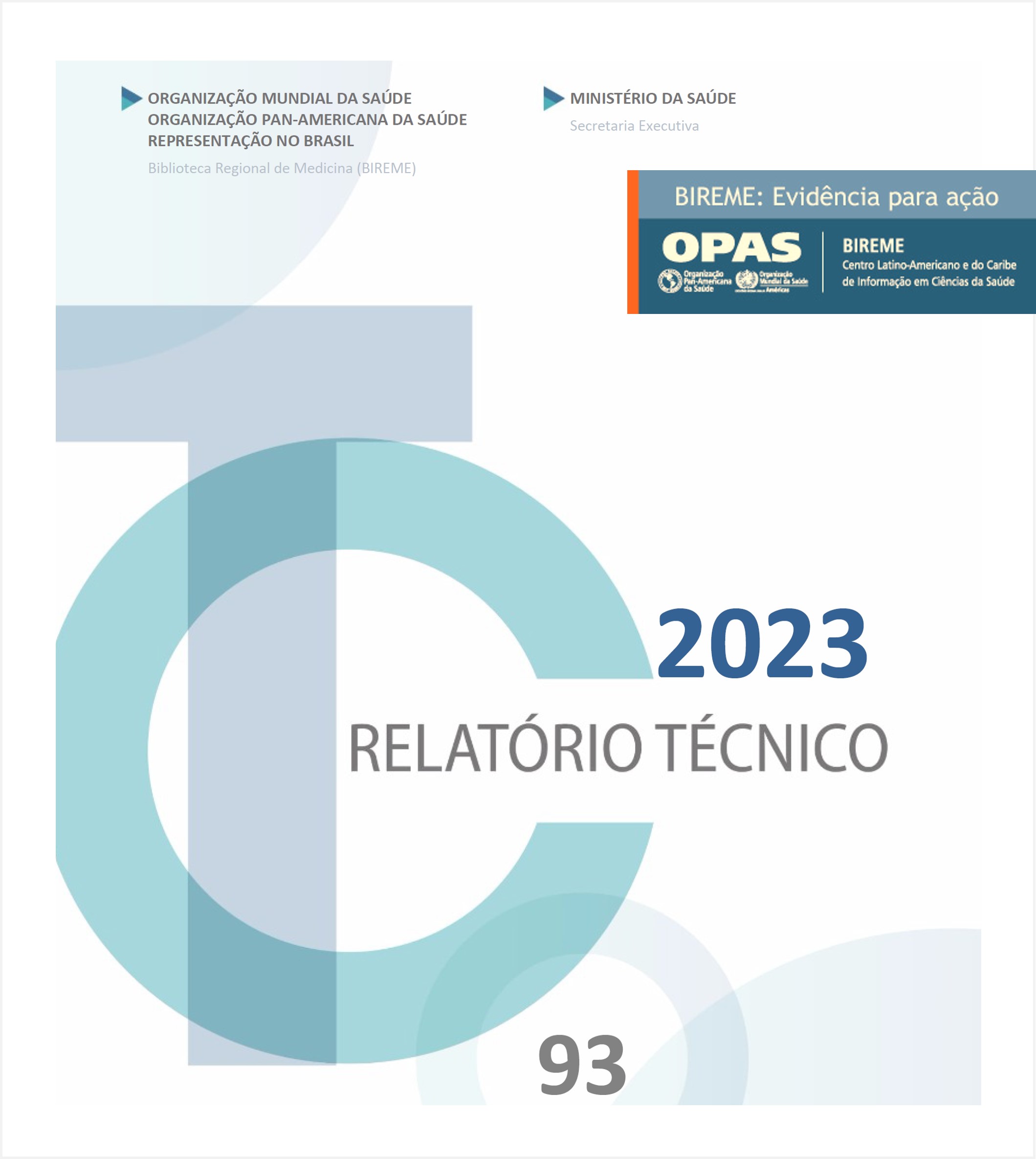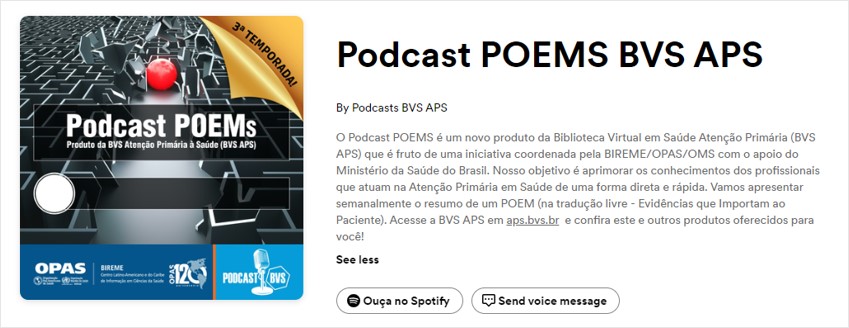This semester, BIREME/PAHO/WHO is exchanging knowledge and information with the technical areas of the Brazilian Ministry of Health (MoH) on the results achieved by the Centre in coordination with the MoH and the Pan American Health Organization/World Health Organization (PAHO/WHO). The technical reports present the status of the products agreed in the Cooperation Terms (CT) 93 and 95, which support BIREME’s Biennial Work Plans.
They cover a series of information and knowledge management projects that have an impact on the entire health information network, including the publication, organization, access and use of scientific and technical information on health, especially in the Americas, aiming to facilitate the use of the most up-to-date evidence available in clinical decision-making and management processes. The reports also highlight the regional scope of the Center’s actions, with activities, products, and services that can be replicated and used at the local, national, and regional levels.
Find below selected highlights of the main products and services from the current Annual Work Plan that were agreed upon in CT 93. Results agreed under CT 95 are available in Part II of this article. Access here.
Cooperation Term No. 93 – Development and Enhancement of the Latin American and Caribbean Center on Health Sciences Information (BIREME) in the context of information and knowledge management in the 2030 Agenda and Universal Health (2022)
Cooperation Term 93, formalized between the Ministry of Health of Brazil, through its Executive Secretariat, and PAHO/WHO, aims to develop and enhance BIREME in the context of information and knowledge management in the 2030 Agenda and Universal Health. Initiated in 2017, it was extended in 2022 for an additional five years and remains in effect until 2027.
The Second Adjustment Term (AT2) of CT93 consists of five expected results (ER), with the total number of planned and completed actions for the period (1st semester of 2023) being monitored, along with the agreed-upon indicators and targets.
- ER1 – Development of information products and services to strengthen the Primary Health Care (PHC) model, the Family Health Strategy, and actions related to the prevention and management of infectious and chronic diseases.
The International Database of GRADE Guidelines (BIGG) received 137 new records in the semester, reaching a total of 1887 guidelines. Regular information updates include metadata quality control, indexing, and categorization according to the Sustainable Development Goals related to health – SDG3.
In the first semester, the VHL PHC POEMS Podcast published a series with 17 new episodes, which were produced in reference to 50 commented summaries of systematic reviews from the POEMS database. The project is in its third season, targeting Primary Care professionals and providing concise summaries of Patient-Oriented Evidence that Matters (POEM) that are relevant to clinical practice. 57 episodes are now freely available on audio distribution platforms.
Other noteworthy updates include over 18,000 downloads of the e-BlueInfo app, the publication of 14 new files of Formative Second Opinion (SOF in Portuguese), and three new Evidence Maps. By the end of the semester, these collections of products and services reaches now a total of 1733 available SOFs and 44 Maps of Evidence divided into three thematic areas: Traditional, Complementary, and Integrative Medicines & Practices (TCIM/PICS), Health Promotion, and COVID-19. The VHL PHC Portal keeps it’s expressive performance, with an audience of 295,000 users, 422,000 sessions, and 544,000 page views.
- ER2 – Exchange of experiences in Health Information and Knowledge Management through national and international cooperation to increase the production, visibility, access, and use of scientific evidence in Latin America and the Caribbean.
In April 2023, the Commemorative Webinar for the Virtual Health Library’s (VHL) 25th Anniversary opened the calendar of scheduled activities for the year, bringing together over 180 members of the VHL Network from Germany, Argentina, Belize, Bolivia, Brazil, Cape Verde, Chile, Colombia, Costa Rica, Ecuador, El Salvador, Spain, the United States, Guatemala, Guyana, Honduras, Jamaica, Mexico, Mozambique, Paraguay, Peru, Puerto Rico, Trinidad and Tobago, Uruguay, and Venezuela. On this occasion, the VHL’s 25 Years Network Portal and the VHL’s 25 Window of Knowledge were launched, including the publication of a series of 21 YouTube videos featuring testimonials from the VHL Network members about their experiences in various countries of the Region.
Training and updating sessions to the Collaboration Network were also conducted throughout the semester, with broad participation from collaborators and information professionals from all countries in Latin America and the Caribbean. In the five training sessions that were held, an average of 138 connections were registred per session, totaling approximately 693 connections from VHL’s cooperating institutions from 22 countries.
- ER3 – Application of information and knowledge management at different levels of the healthcare system through the development of studies, research, creation of research lines, production, and dissemination of digital health and telehealth knowledge for the Brazilian Health System (SUS).
Focusing on Digital Health, the results achieved by BIREME include the complete publication of a Collection of Digital Health Experience Reports, with 24 testimonies from healthcare teams throughout the country. Digital health and telehealth practices were reported in various topics, such as meditation, yoga, art therapy, and Traditional Chinese Medicine.
- ER4 – Strengthened health systems and services to support health information and knowledge management processes and democratize access to and use of scientific evidence.
This component involves a series of updates at VHL information systems and LILACS records, which are regularly and permanently carried out to maintain and improve ongoing operations and projects. All applications and systems have their source codes, technical activity records, and versions available on BIREME’s GitHub.
There is also a highlight for the selection and evaluation process of new journals for LILACS Brazil, which received 15 submissions in the semester. As a result of the analysis and considerations by the members at the XXIII Meeting of the LILACS Brazil Journal Evaluation and Selection Committee, four journals were approved for inclusion in LILACS, subject to the implementation of standardization recommendations, while eight were not approved.
The Fourth Adjustment Term (AT4) of CT93 has the specific objective of implementing the Virtual Health Library (VHL) for indigenous populations in demarcated areas. It consists of one expected result, with the total number of planned and completed actions for the period (1st semester of 2023) being monitored:
- ER5 – Implemented strategies for the development and enhancement of information and knowledge management, through various media, for indigenous health improvement and other health-related topics in the Americas.
Throughout 2023, the collection of information sources of the VHL on Indigenous Health has already published three Windowns of Knowledge: Sanitary Emergency in Yanomami Territory, Alcoholism, and Sexually Transmitted Infections in indigenous peoples. This is a component that also aims to delivery information products and services with technological innovation, such as chatbots, augmented reality, podcasts, and videos.
Please access Part II – CT95 for more information on the Annual Work Plans that BIREME develops in technical cooperation with the Ministry of Health of Brazil.



